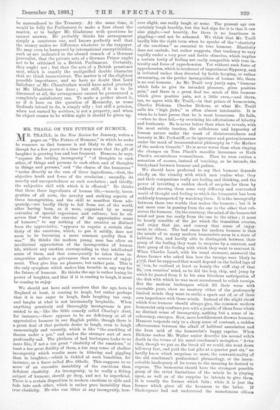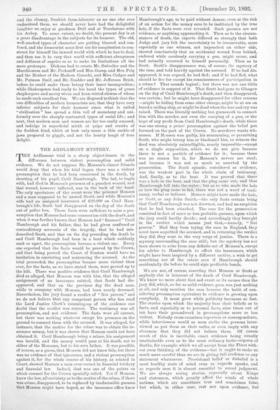MR. TRAILL ON THE FUTURE OF HUMOUR.
MR. TRAILL, in the New Review for January, writes a paper on "The Future of Humour," in which he seeks to reassure us that humour is not likely to die out, even though for a few years at a time it may seem that the gift of laughter is growing less and less frequent. Humour, he says, " exposes the lurking incongruity " " of thoughts to each other, of things and persons to each other, and of thoughts to things and persons," and "the charm of the humorous" "varies directly as the sum of three ingredients, first, the objective truth and force of the revelation ; secondly, its novelty and unexpectedness as such revelation ; and thirdly, the subjective skill with which it is effected." He thinks that these three ingredients of human life,—namely, incon- gruities of all sorts, the novelty and striking aspects of these incongruities, and the skill to manifest them ade- quately,—are hardly likely to fail from out of the world, after having been, as it were, organised by so many centuries of special experience and culture ; but he ob- serves that "even the exercise of the appreciative sense of humour," to say nothing of the creative as distinct from the appreciative, " appears to require a certain elas- ticity of the emotions, which, to put it mildly, does not seem to be becoming a more common quality than it was." He thinks the modern young man has often an intellectual appreciation of the incongruities of human life, without any emotion corresponding to that intellectual sense of them, and that consequently he takes those in- congruities rather as grievances than as sources of enjoy- ment. They give him no pleasure, but rather pain. This is the only symptom which makes him tremble in any way for the future of humour. He thinks the age is rather losing its power of laughter, and that if it is ceasing to laugh, it most be ceasing to enjoy.
We should not have said ourselves that the age, here in England at least, is ceasing to laugh, but rather perhaps that it is too eager to laugh, finds laughing too easy, and laughs at what is not intrinsically laughable. When anything genuinely and thoroughly incongruous is pre- sented to us,—like the little comedy called Charley's Aunt, for instance,—there appears to be no deficiency at all of appreciative humour in our English public, though there is a great deal of that pathetic desire to laugh, even to laugh nnmeaningly and vacantly, which is like "the crackling of thorns under a pot," and makes the stronger sort of men profoundly sad. The plethora of bad burlesques looks to us more like, if not a too great " elasticity of the emotions," at least a too great fluidity of them, a too easy sense of shallow incongruity which results more in tittering and giggling than in laughter,—which is tickled at such banalities, for instance, as a farce called Mrs. Othello. This suggests to us more " of an excessive instability of the emotions than deficient elasticity. An incongruity, to be really a fitting subject of humour, should go deep, and not be superficial. There is a certain disposition in modern emotions to slide and fade into each other, which is rather pure instability than true elasticity. He who can titter at any incongruity, how- ever slight, can really laugh at none. The present age can certainly laugh heartily, but the bad sign for it is that it can also giggle,—not heartily, for there is no heartiness in giggling,—and not be ashamed. We think that Mr. Trail hardly hits the right term when he speaks of the " elasticity of the emotions" as essential to true humour. Elasticity does not exclude, but rather suggests, that tendency to vary rapidly under a very poor and feeble stimulus, which implies a certain levity of feeling not easily compatible with true in- tensity and force of apprehension. Yet without such force of apprehension, which is intolerant of impertinent flippancy, and is irritated rather than diverted by feeble harping, or rather strumming, on the pettier incongruities of human life, there is no real humour. As Mr. Traill very justly says, "humour which fails to give its intended pleasure, gives positive pain," and there is a great deal too much of this humour which gives positive pain, not a little even,—and there, too, we agree with Mr. Traill,—in that prince of humourists, Charles Dickens. Charles Dickens, at what Mr. Trail calls his " high jinks," is often almost intolerable. It is when he is least jocose that he is most humorous. He fails, —when he does fail,—by overdoing his affectations of hilarity and bonhomie. He is never better than when he reveals, with his most subtle touches, the selfishness and hypocrisy of human nature under the mask of disinterestedness and honesty in Mr. Pecksniff, or its ignorance and pretentiousness under the mask of transcendental philosophy in " the Mother of the modern Gracchi." He is never worse than when ringing the changes on Tom Pinch's maudlin innocence or Ruth Pinch's ostentatious womanliness. Then he even excites a sensation of nausea, instead of touching, as he intends, the borderland between humour and pathos.
We should have preferred to say that humour depends chiefly on the vivacity with which men realise what they and their companions really are feeling and thinking, and the power of inventing a sudden shock of surprise for them by suddenly showing them some very differe4 and contrasted world of thought and feeling to which the hiiraourist has been suddenly transported by watching them. It is the incongruity between these two worlds that makes the humour ; but it is not mere ease in passing from the one to the other that sub- serves the humour. On the contrary, the mind of the humourist must not pass too easily from the one to the other ; it must be keenly sensible of the jar which the transition creates, and enjoy that jar, and convey that sense of enjoy- ment to others. The bad omen for modern humour is that the minds of so many modern humourists seem in a state of habitual flux, and hardly able to distinguish between their grasp of the feeling they want to surprise by a contrast, and their grasp of the feeling with which they want to contrast it.
When Charles Lamb, with his usual stammer, answered the dense farmer who asked him how the turnips were likely to 374 eld, that he supposed that would depend on the boiled legs of m ton, he realised at least as keenly the stiff clay of that Ea ;ern counties' mind, as he did the hop, skip, and jump by which he passed from it to his own frivolous anticipation of the dish with which he was most accustomed to relish turnips. But the modern burlesques which fill their verse with execrable puns, show no mastery either of the grotesquely limited minds they want to strike a spark out of, or of their own impatience with those minds. Instead of the slight shook which true humour should always give, the common modern humourist only confuses you with a jumble of ideas from which no distinct sense of incongruity, nothing but a sense of in- coherency, emerges. Now, mere bewilderment drowns humour. Humour responds only to a sharp sense of contrast, a sudden effervescence between the alkali of habitual association and the keen acid of the humourist's happy caprice. When Dickens makes Mr. Weller senior describe his second wife's death in the terms of his usual coachman's metaphor, " Atter that, though we put on the break all we could, she went down hill wery fast, and paid the last pike at a quarter past six," we hardly know which surprises us most, the conventionality of the old coachman's professional phraseology, or the incon- ceivable inadequacy of its terms to the meaning he desired to express. The humourist should have the strongest possible grasp of the strict limitations of the minds he is playing upon, as well as of the surprise he intends to give them. It is usually the former which fails ; while it is just the former which gives all the keenness to the latter. If Shakespeare had not understood the monotonous citizen and the clumsy, freakish farm-labourer as no one else ever understood them, we should never have had the delightful laughter we enjoy at goodman Dull and at Touchstone with his Aubry. To some extent, no doubt, the present day is at a great disadvantage in the subjects for its humour. The old, well-marked types of character are getting blurred and con- fused, and the bumourist must first use his imagination to con- struct for himself the inward world with which he has to deal, and then use it to vary that world with sufficient abruptness and deftness of caprice so as to make its limitations all the more grotesque. Dickens had to create Mr. Swiveller and the Marchioness and Mr. Pecksniff and Mrs. Gawp, and Mrs. Prig and the Mother of the Modern Gracchi, and Miss Codger and Mr. Putnam Smif, and Mr. Scadder and Mr. Jefferson Brick, before he could make them betray their inner incongruities ; while Shakespeare had ready to his hand the types of gross shopkeepers and merry wives and keen-witted clowns of whom he made such excellent fun. We are disposed to think that the two difficulties of modern humourists are, that they have very inferior subjects for their humour since what is called " civilisation " has spread a thin veil of monotony and uni- formity over the sharply contrasted types of social life ; and next, that modern men and women are far too easily amused, and indulge in superficial mirth at quips and cranks of the feeblest kind, which at best only cause a thin cackle of jaws prepared to giggle, and not the hearty laugh of true delight.



































 Previous page
Previous page